Analyzing McDonald's Economic Decisions: A Case Study on Globalization
VerifiedAdded on 2022/11/28
|6
|815
|495
Case Study
AI Summary
This case study examines the impact of globalization on McDonald's economic decisions, focusing on the challenges and strategies the company faced in 2012. It analyzes macroeconomic factors like declining consumer sentiment and global economic uncertainty, which caused headwinds for McDonald's, including the impact of increased competition from rivals like Burger King and Wendy's, who employed various non-price competitive strategies and promotional offers. The study explores McDonald's Dollar Menu strategy, its elasticity assumptions, and its impact on revenue. It further investigates how the development of mini-restaurants improved profitability and the influence of governmental policies on McDonald's international expansion. The analysis incorporates sources to provide a comprehensive understanding of the complexities of globalization on the fast-food industry and McDonald's strategic responses.
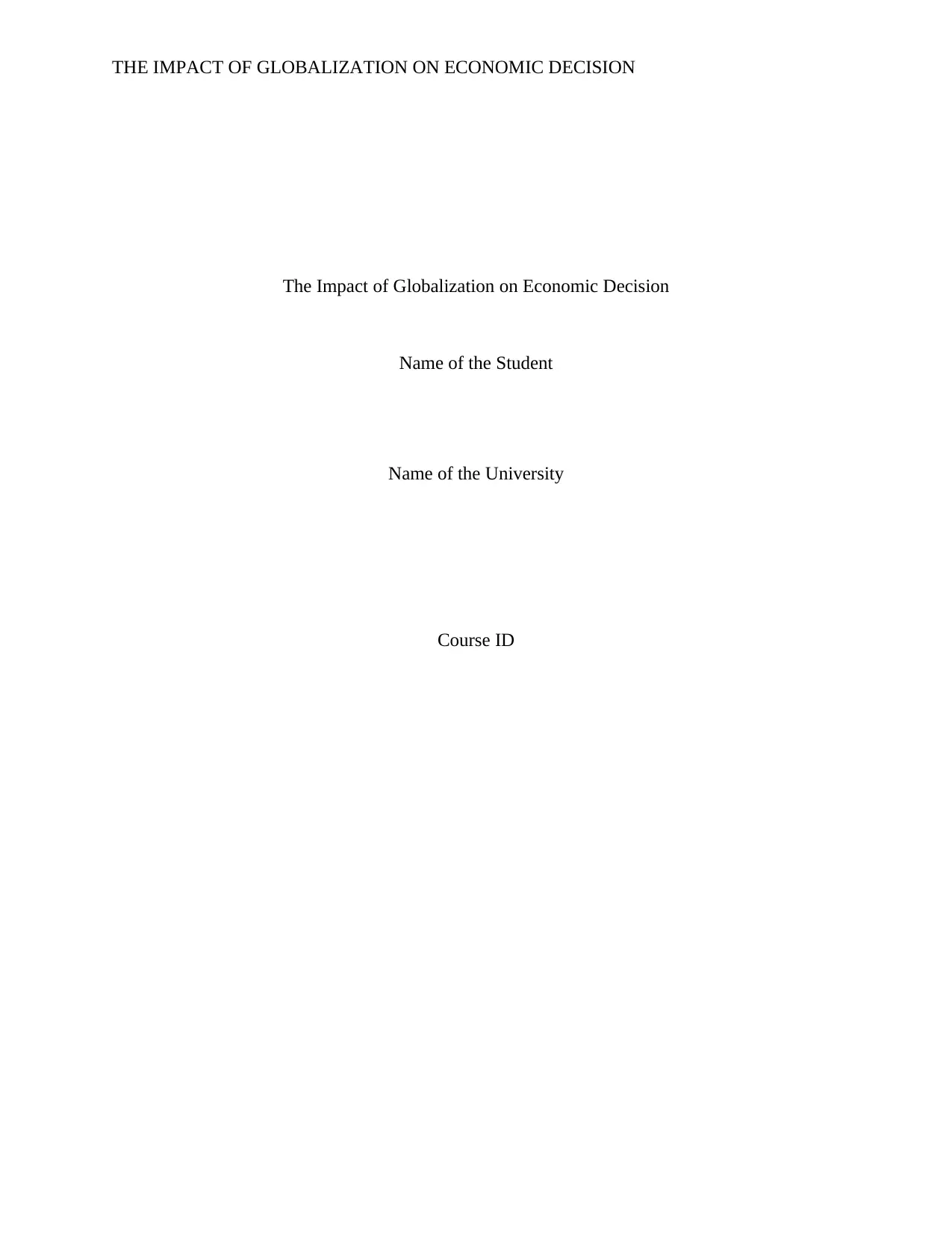
THE IMPACT OF GLOBALIZATION ON ECONOMIC DECISION
The Impact of Globalization on Economic Decision
Name of the Student
Name of the University
Course ID
The Impact of Globalization on Economic Decision
Name of the Student
Name of the University
Course ID
Paraphrase This Document
Need a fresh take? Get an instant paraphrase of this document with our AI Paraphraser
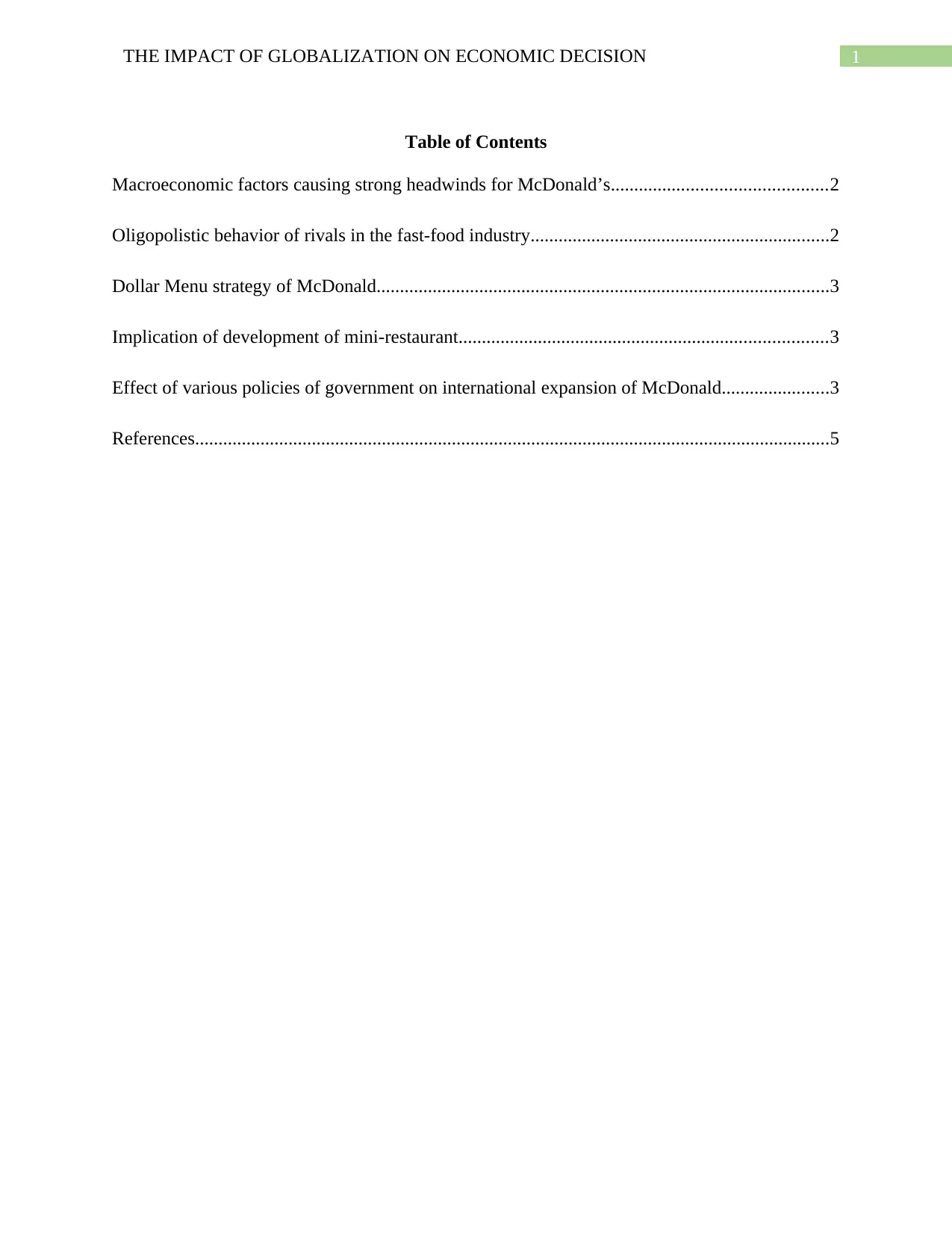
1THE IMPACT OF GLOBALIZATION ON ECONOMIC DECISION
Table of Contents
Macroeconomic factors causing strong headwinds for McDonald’s..............................................2
Oligopolistic behavior of rivals in the fast-food industry................................................................2
Dollar Menu strategy of McDonald.................................................................................................3
Implication of development of mini-restaurant...............................................................................3
Effect of various policies of government on international expansion of McDonald.......................3
References........................................................................................................................................5
Table of Contents
Macroeconomic factors causing strong headwinds for McDonald’s..............................................2
Oligopolistic behavior of rivals in the fast-food industry................................................................2
Dollar Menu strategy of McDonald.................................................................................................3
Implication of development of mini-restaurant...............................................................................3
Effect of various policies of government on international expansion of McDonald.......................3
References........................................................................................................................................5
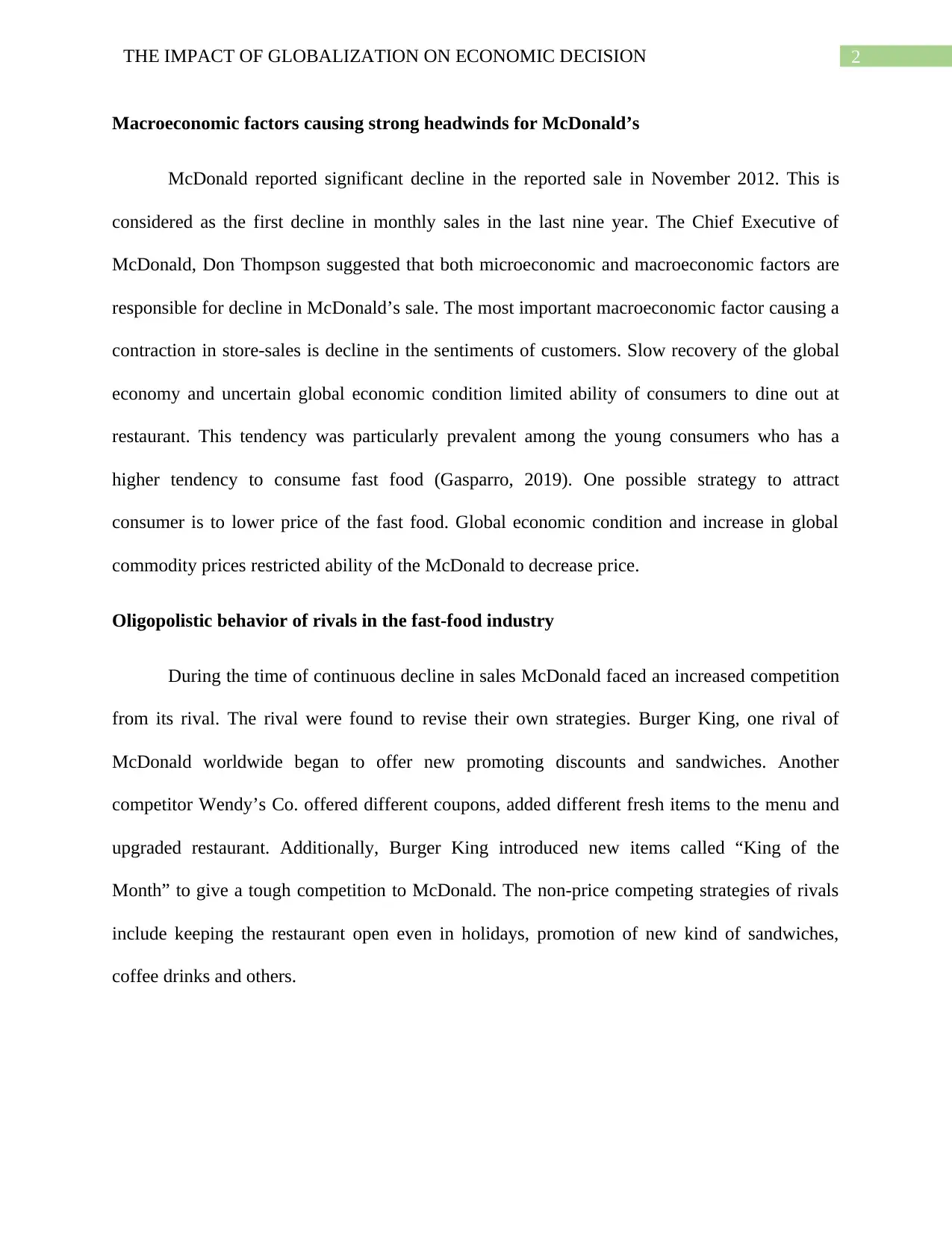
2THE IMPACT OF GLOBALIZATION ON ECONOMIC DECISION
Macroeconomic factors causing strong headwinds for McDonald’s
McDonald reported significant decline in the reported sale in November 2012. This is
considered as the first decline in monthly sales in the last nine year. The Chief Executive of
McDonald, Don Thompson suggested that both microeconomic and macroeconomic factors are
responsible for decline in McDonald’s sale. The most important macroeconomic factor causing a
contraction in store-sales is decline in the sentiments of customers. Slow recovery of the global
economy and uncertain global economic condition limited ability of consumers to dine out at
restaurant. This tendency was particularly prevalent among the young consumers who has a
higher tendency to consume fast food (Gasparro, 2019). One possible strategy to attract
consumer is to lower price of the fast food. Global economic condition and increase in global
commodity prices restricted ability of the McDonald to decrease price.
Oligopolistic behavior of rivals in the fast-food industry
During the time of continuous decline in sales McDonald faced an increased competition
from its rival. The rival were found to revise their own strategies. Burger King, one rival of
McDonald worldwide began to offer new promoting discounts and sandwiches. Another
competitor Wendy’s Co. offered different coupons, added different fresh items to the menu and
upgraded restaurant. Additionally, Burger King introduced new items called “King of the
Month” to give a tough competition to McDonald. The non-price competing strategies of rivals
include keeping the restaurant open even in holidays, promotion of new kind of sandwiches,
coffee drinks and others.
Macroeconomic factors causing strong headwinds for McDonald’s
McDonald reported significant decline in the reported sale in November 2012. This is
considered as the first decline in monthly sales in the last nine year. The Chief Executive of
McDonald, Don Thompson suggested that both microeconomic and macroeconomic factors are
responsible for decline in McDonald’s sale. The most important macroeconomic factor causing a
contraction in store-sales is decline in the sentiments of customers. Slow recovery of the global
economy and uncertain global economic condition limited ability of consumers to dine out at
restaurant. This tendency was particularly prevalent among the young consumers who has a
higher tendency to consume fast food (Gasparro, 2019). One possible strategy to attract
consumer is to lower price of the fast food. Global economic condition and increase in global
commodity prices restricted ability of the McDonald to decrease price.
Oligopolistic behavior of rivals in the fast-food industry
During the time of continuous decline in sales McDonald faced an increased competition
from its rival. The rival were found to revise their own strategies. Burger King, one rival of
McDonald worldwide began to offer new promoting discounts and sandwiches. Another
competitor Wendy’s Co. offered different coupons, added different fresh items to the menu and
upgraded restaurant. Additionally, Burger King introduced new items called “King of the
Month” to give a tough competition to McDonald. The non-price competing strategies of rivals
include keeping the restaurant open even in holidays, promotion of new kind of sandwiches,
coffee drinks and others.
⊘ This is a preview!⊘
Do you want full access?
Subscribe today to unlock all pages.

Trusted by 1+ million students worldwide
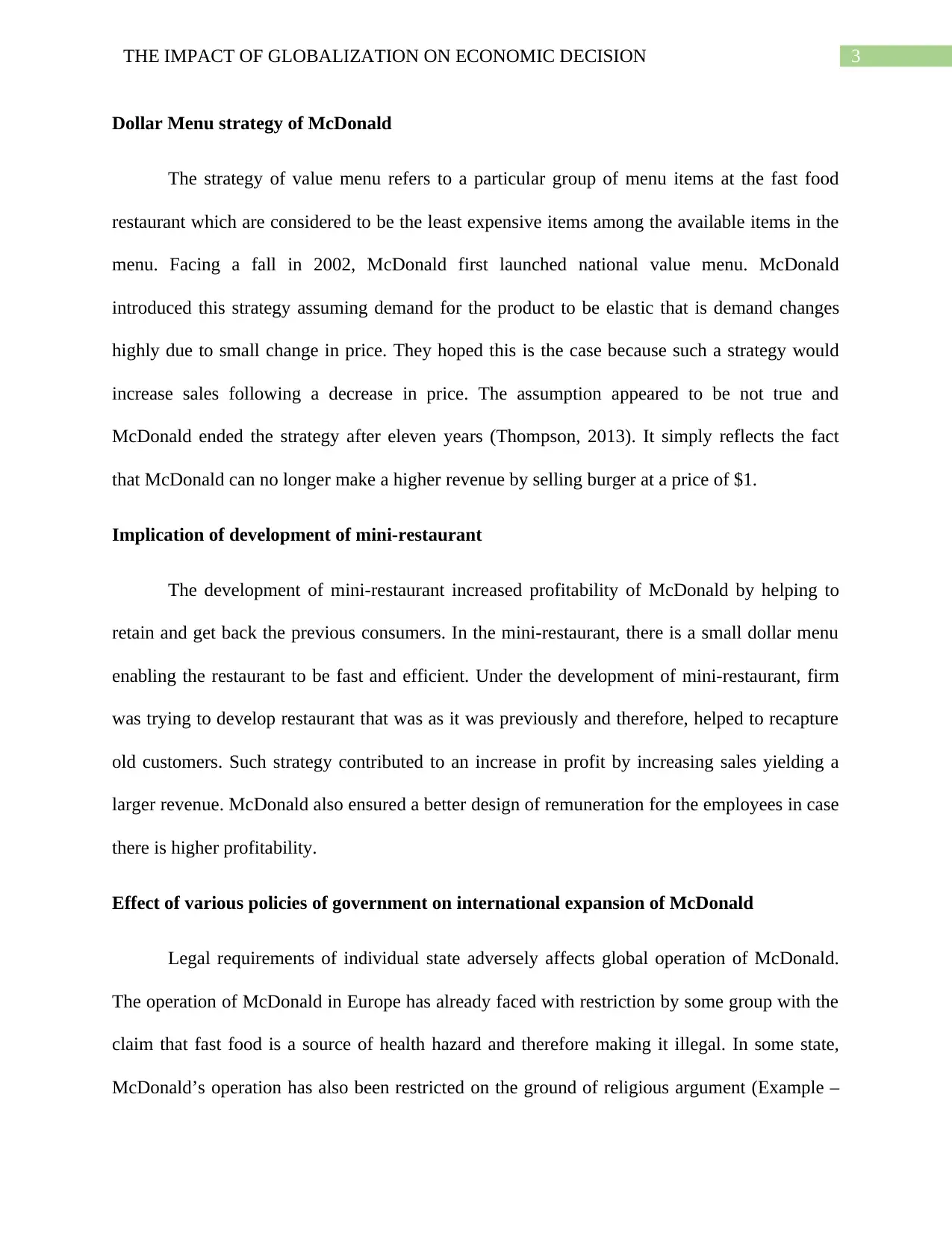
3THE IMPACT OF GLOBALIZATION ON ECONOMIC DECISION
Dollar Menu strategy of McDonald
The strategy of value menu refers to a particular group of menu items at the fast food
restaurant which are considered to be the least expensive items among the available items in the
menu. Facing a fall in 2002, McDonald first launched national value menu. McDonald
introduced this strategy assuming demand for the product to be elastic that is demand changes
highly due to small change in price. They hoped this is the case because such a strategy would
increase sales following a decrease in price. The assumption appeared to be not true and
McDonald ended the strategy after eleven years (Thompson, 2013). It simply reflects the fact
that McDonald can no longer make a higher revenue by selling burger at a price of $1.
Implication of development of mini-restaurant
The development of mini-restaurant increased profitability of McDonald by helping to
retain and get back the previous consumers. In the mini-restaurant, there is a small dollar menu
enabling the restaurant to be fast and efficient. Under the development of mini-restaurant, firm
was trying to develop restaurant that was as it was previously and therefore, helped to recapture
old customers. Such strategy contributed to an increase in profit by increasing sales yielding a
larger revenue. McDonald also ensured a better design of remuneration for the employees in case
there is higher profitability.
Effect of various policies of government on international expansion of McDonald
Legal requirements of individual state adversely affects global operation of McDonald.
The operation of McDonald in Europe has already faced with restriction by some group with the
claim that fast food is a source of health hazard and therefore making it illegal. In some state,
McDonald’s operation has also been restricted on the ground of religious argument (Example –
Dollar Menu strategy of McDonald
The strategy of value menu refers to a particular group of menu items at the fast food
restaurant which are considered to be the least expensive items among the available items in the
menu. Facing a fall in 2002, McDonald first launched national value menu. McDonald
introduced this strategy assuming demand for the product to be elastic that is demand changes
highly due to small change in price. They hoped this is the case because such a strategy would
increase sales following a decrease in price. The assumption appeared to be not true and
McDonald ended the strategy after eleven years (Thompson, 2013). It simply reflects the fact
that McDonald can no longer make a higher revenue by selling burger at a price of $1.
Implication of development of mini-restaurant
The development of mini-restaurant increased profitability of McDonald by helping to
retain and get back the previous consumers. In the mini-restaurant, there is a small dollar menu
enabling the restaurant to be fast and efficient. Under the development of mini-restaurant, firm
was trying to develop restaurant that was as it was previously and therefore, helped to recapture
old customers. Such strategy contributed to an increase in profit by increasing sales yielding a
larger revenue. McDonald also ensured a better design of remuneration for the employees in case
there is higher profitability.
Effect of various policies of government on international expansion of McDonald
Legal requirements of individual state adversely affects global operation of McDonald.
The operation of McDonald in Europe has already faced with restriction by some group with the
claim that fast food is a source of health hazard and therefore making it illegal. In some state,
McDonald’s operation has also been restricted on the ground of religious argument (Example –
Paraphrase This Document
Need a fresh take? Get an instant paraphrase of this document with our AI Paraphraser
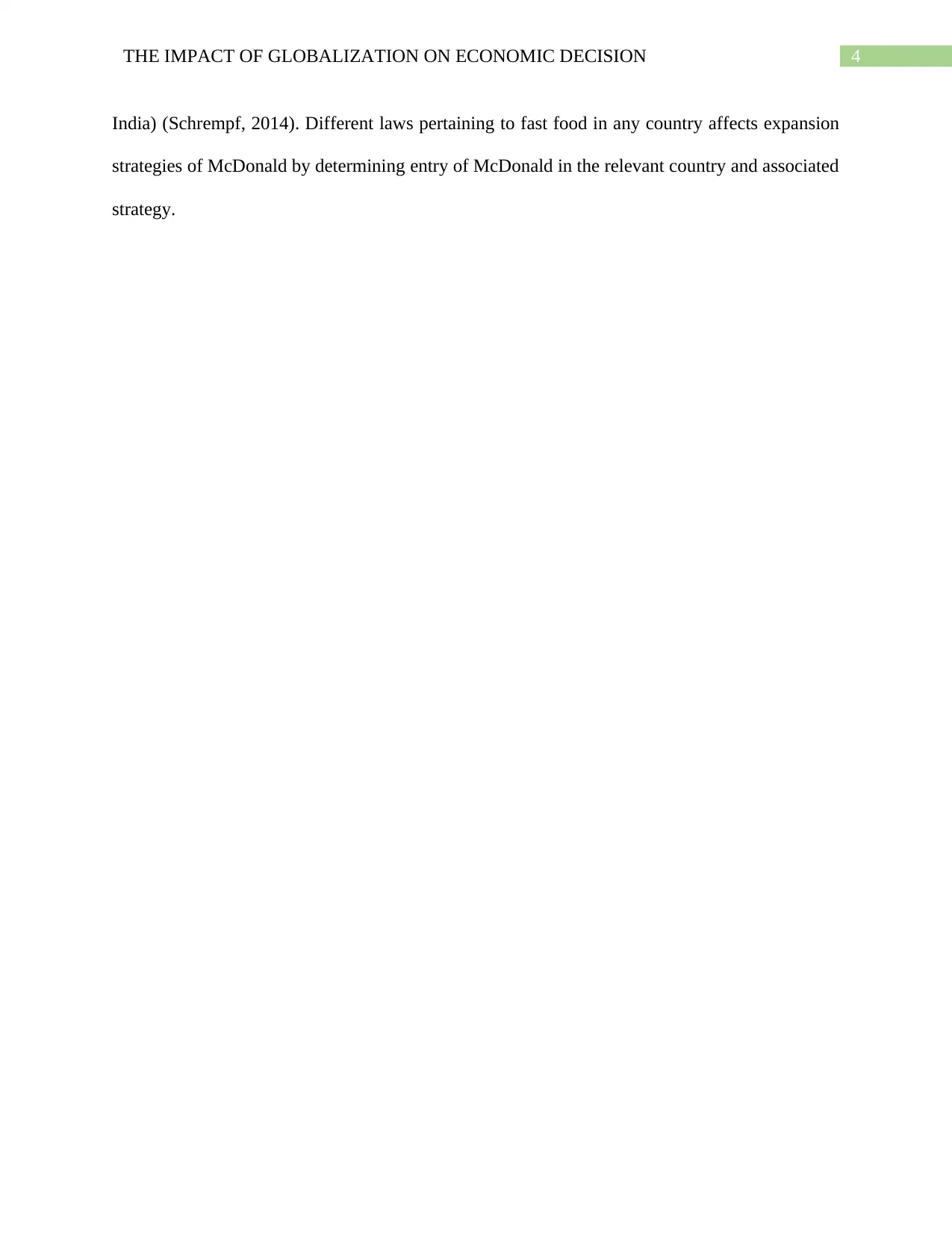
4THE IMPACT OF GLOBALIZATION ON ECONOMIC DECISION
India) (Schrempf, 2014). Different laws pertaining to fast food in any country affects expansion
strategies of McDonald by determining entry of McDonald in the relevant country and associated
strategy.
India) (Schrempf, 2014). Different laws pertaining to fast food in any country affects expansion
strategies of McDonald by determining entry of McDonald in the relevant country and associated
strategy.
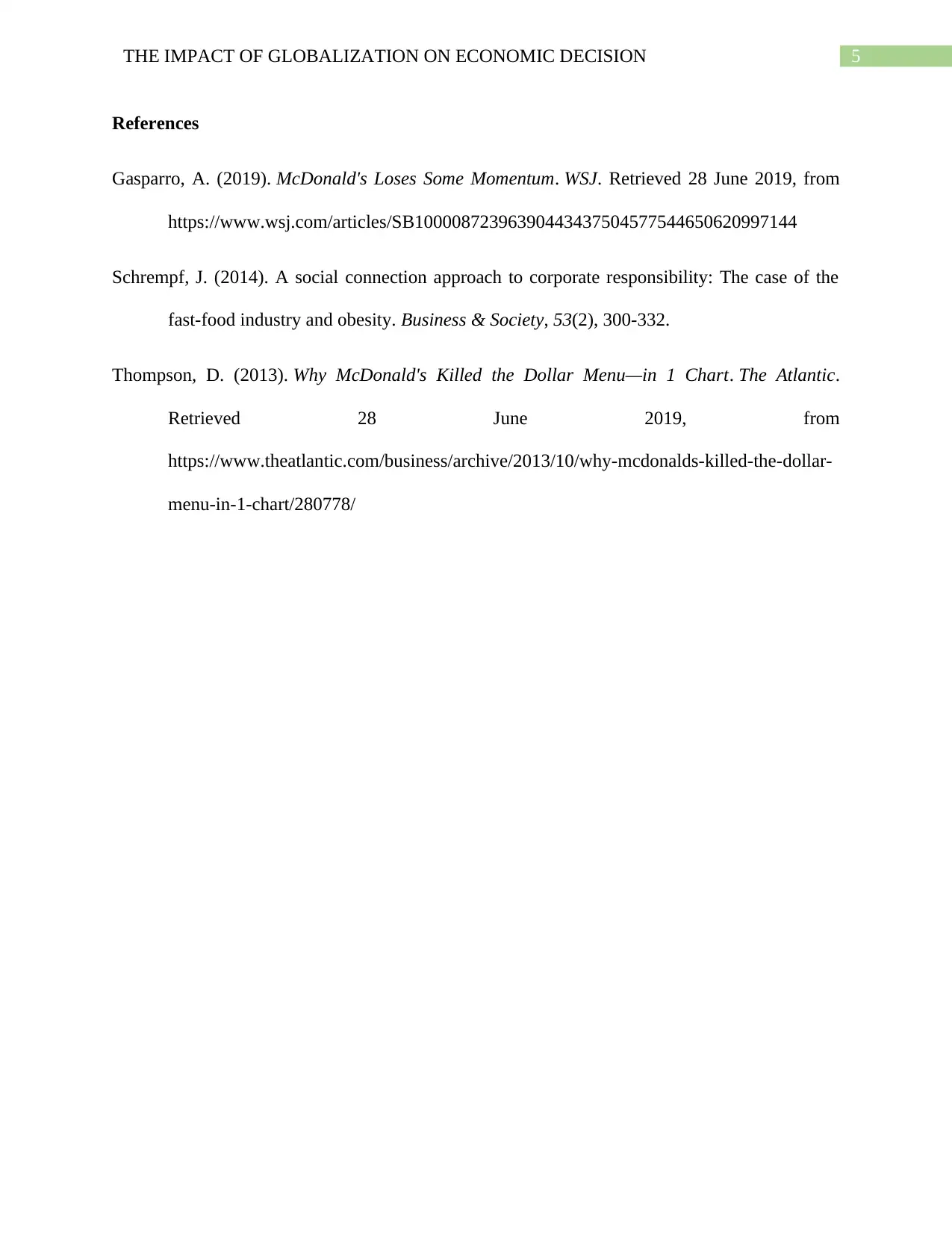
5THE IMPACT OF GLOBALIZATION ON ECONOMIC DECISION
References
Gasparro, A. (2019). McDonald's Loses Some Momentum. WSJ. Retrieved 28 June 2019, from
https://www.wsj.com/articles/SB10000872396390443437504577544650620997144
Schrempf, J. (2014). A social connection approach to corporate responsibility: The case of the
fast-food industry and obesity. Business & Society, 53(2), 300-332.
Thompson, D. (2013). Why McDonald's Killed the Dollar Menu—in 1 Chart. The Atlantic.
Retrieved 28 June 2019, from
https://www.theatlantic.com/business/archive/2013/10/why-mcdonalds-killed-the-dollar-
menu-in-1-chart/280778/
References
Gasparro, A. (2019). McDonald's Loses Some Momentum. WSJ. Retrieved 28 June 2019, from
https://www.wsj.com/articles/SB10000872396390443437504577544650620997144
Schrempf, J. (2014). A social connection approach to corporate responsibility: The case of the
fast-food industry and obesity. Business & Society, 53(2), 300-332.
Thompson, D. (2013). Why McDonald's Killed the Dollar Menu—in 1 Chart. The Atlantic.
Retrieved 28 June 2019, from
https://www.theatlantic.com/business/archive/2013/10/why-mcdonalds-killed-the-dollar-
menu-in-1-chart/280778/
⊘ This is a preview!⊘
Do you want full access?
Subscribe today to unlock all pages.

Trusted by 1+ million students worldwide
1 out of 6
Related Documents
Your All-in-One AI-Powered Toolkit for Academic Success.
+13062052269
info@desklib.com
Available 24*7 on WhatsApp / Email
![[object Object]](/_next/static/media/star-bottom.7253800d.svg)
Unlock your academic potential
Copyright © 2020–2025 A2Z Services. All Rights Reserved. Developed and managed by ZUCOL.





